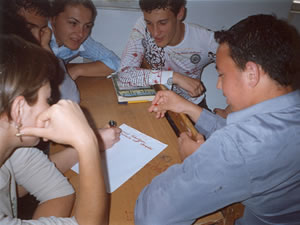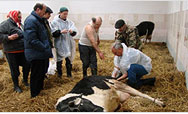Shelter Offers Sanctuary, Support to Child Trafficking Victims
Bathed in warm sunlight, the children’s rooms at Another Vision (Tjeter Vizion) offer a sharp contrast to the harsh lives these youths have recently fled. Clean and bright, each room contains two or three wooden beds covered in colorful blankets. Pastel colored walls decorated with children’s drawings make the rooms inviting–an environment where fractured young lives can begin to heal.
Another Vision is one of three USAID grantees that specifically support children and adolescents who have been trafficked or are at-risk of being trafficked. Another Vision’s work is a testament to its ultimate aim – to prevent trafficking, as well as help victims rebuild healthy lives.
“There are various reasons children get trafficked. Sometimes the family is involved,” says Teit Tabaku, Project Manager for Families and Youth at Another Vision. “Sometimes someone offers to take the child to Greece to work and send money back to the family. Adolescent girls run away from home and fall prey to traffickers.”
At-risk and trafficked minors are referred to the Another Vision center by anti-trafficking police and Terre des hommes, an international organization that works on behalf of underprivileged children. Children, ages six to 13, live at a residential center, while those 14 and older live in what the staff refer to as “Apartments of High Autonomy” which are designed to enable adolescents to become self-reliant.
When a child is referred to Another Vision, she is monitored for two months and an individual plan for her development is created.
“When a child first arrives he or she is disoriented because they have been handled by both border police and anti-trafficking police. They cry, they are afraid, they don’t know what is expected of them,” said Tabaku. “In the first moments, they are observing us and so we remain passive. We then put them in an environment where there are children and provide them with services. It doesn’t take more than two or three days for them to come around – a child is like a rubber band.”
 |
| At an awareness-raising session, high school students in Elbasan discuss how to help protect themselves and their friends from being trafficked |
Under the Coordinated Action Against Human Trafficking (CAAHT) project, Another Vision supports 39 minors; boys and girls ranging in age from 6 to 19 years old. Of these, some were at high risk of being trafficked due to extreme poverty and dysfunctional families, while others had already been trafficked. Along with psychosocial interventions, education is a high priority at the center and most residents are enrolled in the local school. Because the center makes every attempt to have children maintain contact with their families, staff members also work with parents and guardians to teach them how to nurture their children. In fact, when possible, the children are sent home for weekends, unless family dynamics have not sufficiently improved with the center’s intervention. The goal of the organization is to reunite their beneficiaries with their families whenever possible. The staff at Another Vision takes care to know these families well, which enables them to determine whether having the child return home might compromise his or her safety.
Another Vision’s “Apartments of High Autonomy” are a short ride from the center’s main grounds where the younger children live. The apartment building is a basic cement block. The apartment shared by four girls has dark paneling but is clean and contains two bedrooms, a kitchen and bathroom. Two well-worn couches nearly fill the communal room. Zhaneta, 15, and her sister 17-year old sister Mirela, have been with Another Vision for nine years. This year, Yolanda will be in eighth grade and is reading Euripides to prepare for the new school year. Brigitte is in the third year of high school and spent the past summer taking cooking, tailoring and English language classes offered by the center to provide youth with vocational skills.
Unlike Zhaneta and Mirela who are friendly and forthcoming, 15-year old Elona sits slightly hunched forward and gazes at the floor. Presently, working as a tailor in a factory, Elona is completing eighth grade through a correspondence course. She came to the center a year and a half ago.
“She was a difficult case. She was trafficked to Greece at age 12 and when she came to us she used bad language, and was provocative with men,” said Skerdi Ogreni, Another Vision’s Coordinator of Residential Centers. “But she is doing better now. We are working with another NGO in her hometown of Berat, which is making efforts to find her a job and assessing her family to make sure it is safe for her to return,” added Ogreni.
Dark-haired 20-year-old Enea, has been with the center for eight years. After her mother’s death, she went to live with an aunt who forced her to work. Enea has finished high school and is preparing to take her university entrance exams. She wants to be a biochemist and spent her summer working as a tailor in a nearby factory.
“They are good students. They average B+ and A-. I’m really proud of them. They’ve even learned to budget their finances. I’ve worked with these girls for years and I can truly say they are successful cases,” said Ogreni, beaming as if speaking of his own daughters.
Another Vision also operates a center for 200 women and girls in the town of Gramsh, a 30-minute drive from Elbasan. Between its centers in Elbasan and Gramsh, Another Vision directly supports about 500 kids annually in addition to students reached through school-based and summer camp awareness-raising activities. Nearly 113 kids come daily to the youth center where they publish a newspaper for their peers, record music CDs, and take part in other activities that keep them off the streets.
Back to Top ^ |


